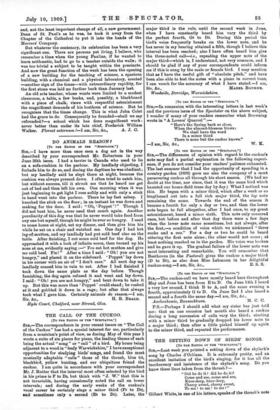[To THE EDITOR OF THE "SPECTATOR"] SIR,—The differences of opinion
with regard to the cuckoo's note may find a partial explanation in the following experi- ence, if you do not consider your readers' patience exhausted. The last summer that I had the opportunity of spending in a country garden (1893) gave me also the company of a most persevering cuckoo all through his short season. (We had no doubt at the time, nor since, that it was the same bird which haunted our home-field trees day by day.) What I noticed was this. He began with a minor third, which after a week or so lengthened out into a full rich major third, the top note remaining the same. Towards the end of the season it became a fourth for only a day or two, and then the lower note began to fail altogether, after I had once, to my great astonishment, heard a minor sixth. This note only occurred once, but before and after that day there were a few days when the lower note came sometimes, but not always, after the first,—a condition of voice which we nicknamed "three cooks and a coo." For a day or two he could be heard uttering the first note alone ; the other would not come; at least nothing reached us in the garden. His voice was broken and he gave it up. The gradual failure of the lower note was most interesting and remarkable. You will remember that Beethoven (in the Pastoral) gives the cuckoo a major third (D to 1h), as also does Miss Lehmann in her delightful










































 Previous page
Previous page